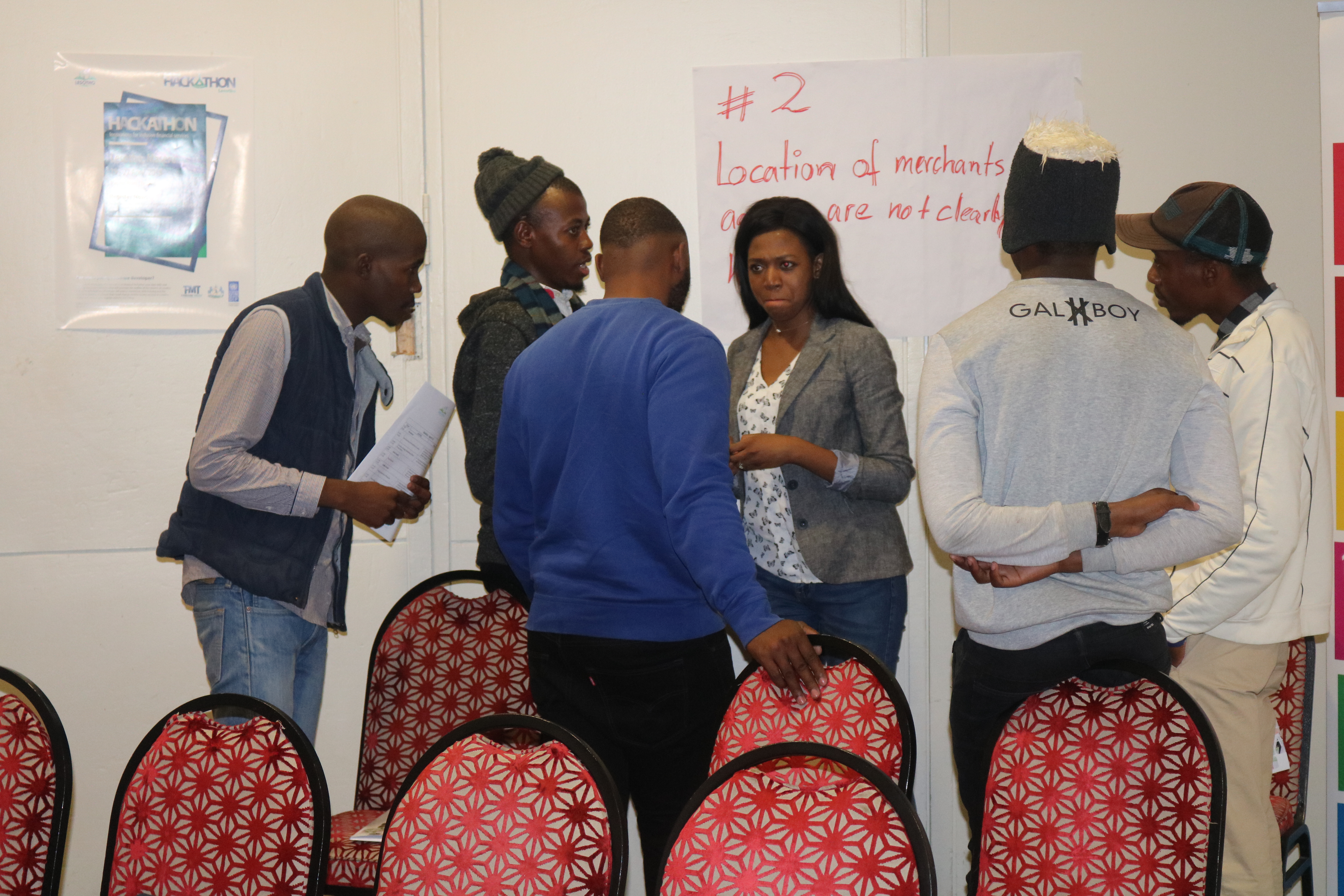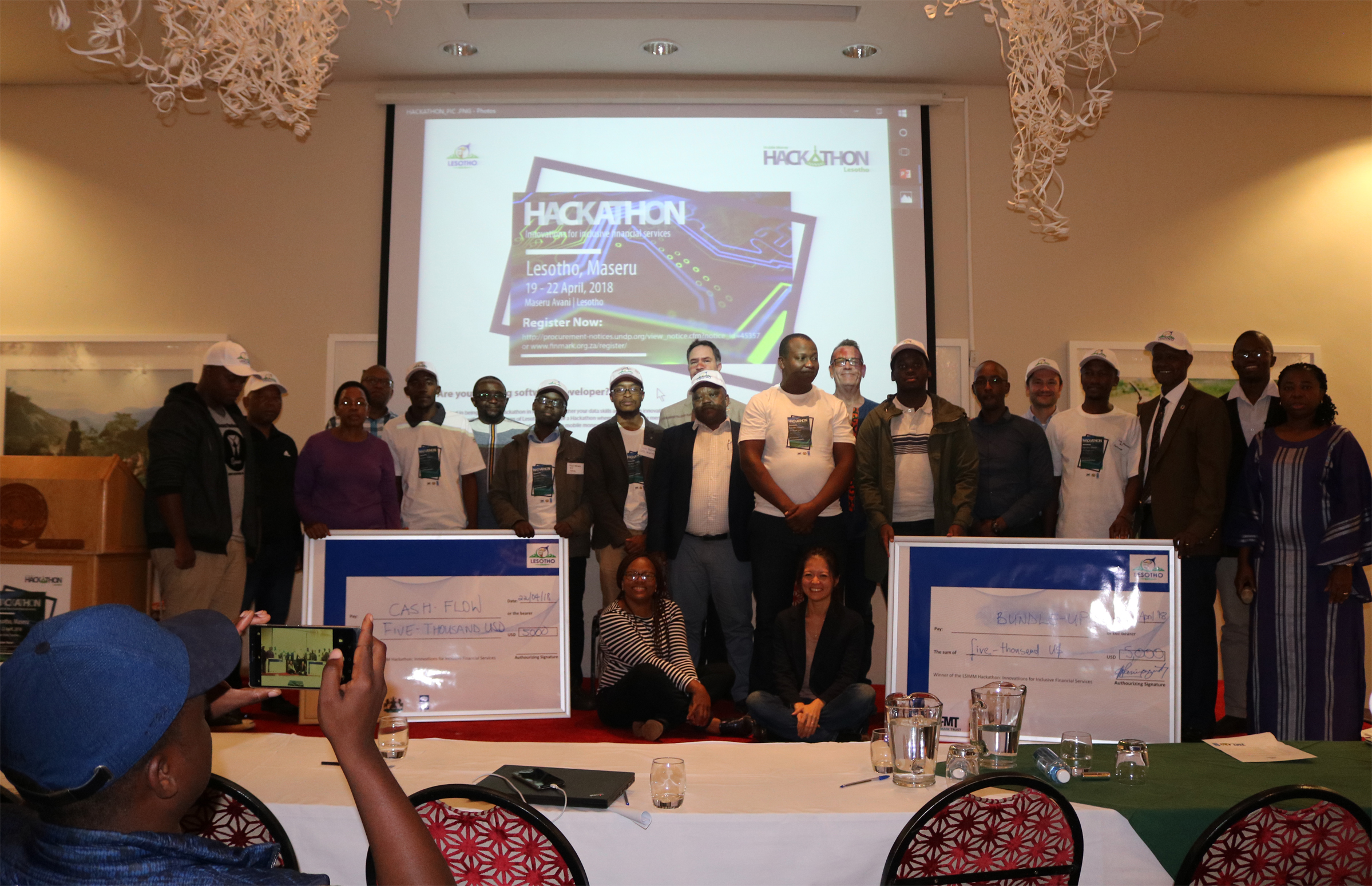 Hackathon on inclusive financial services
Promoting innovative solutions to enhance financial inclusion in Lesotho
Hackathon on inclusive financial services
Promoting innovative solutions to enhance financial inclusion in Lesotho

Challenges
Access to formal and semi-formal financial services is limited in Lesotho, especially for low-income and rural populations. The majority of the population is excluded from the formal credit system, while restricted accessibility and high pricing of banking products further limit uptake. The Government of Lesotho has recognized this issue as a major constraint to job creation and income generation and has prioritized financial inclusion in both the National Strategic Development Plan and the Financial Sector Development Strategy.
Mobile money offers an important avenue to deliver financial services in Lesotho, as the use of mobile phones is widespread, with an estimated accessibility rate of 70 percent of adults. Yet, 2016 research by the United Nations Development Programme (UNDP) on Lesotho’s mobile-money sector identified some systemic problems within the enabling business environment and highlighted four areas that prevent mobile money products from reaching scale and providing valuable financial services to underserved populations: awareness, acceptance, availability and affordability.
Towards a Solution
The Hackathon on Inclusive Financial Services was a competition organized as part of the Lesotho Scaling Inclusion through Mobile Money (SIMM) project initiated in 2017 by the Ministry of Finance and UNDP Lesotho. The competition aimed at generating new ideas and facilitating mobile money product diversification to unlock opportunities for improved access to financial services. Innovations in the mobile-money sector provide an opportunity for low-income and rural populations to gain access to credit, savings and insurance products.
The objectives of the competition were to:
- design and develop next-generation applications to improve on existing digital financial systems and product offerings;
- create Lesotho-relevant technological solutions to local challenges;
- facilitate the use of technology to bridge the financial-inclusion divide in Lesotho; and
- leverage existing information, networks and human capacity to generate innovations.
Held in April 2018, the three-day Lesotho SIMM Hackathon provided a platform for young innovators to collaborate and explore their ideas, while interacting with private-sector and civil-society experts and practitioners in the fields of financial services and business development. The event targeted individuals with an interest in developing solutions to unique mobile-money ecosystem challenges in Lesotho, with extensive support provided by mentors and stakeholders throughout the duration of the competition.
During the Hackathon, 62 participants in 17 teams developed prototype solutions that were presented to a panel of judges during a final pitching session. Assessed according to a range of fundamental criteria, the seven winning teams received a cash prize of US $5,000 each, as well as continued mentorship and technical support to enable the development of their solutions up to market introduction. The evaluation of the initiative highlighted the importance of linking innovation and financial inclusion, using skills development and mentorship and tapping into partnership, networking and collaboration opportunities.
The initiative eventually enabled the development of the following solutions:
- ITMAS (by TECHNIFY): an e-ticket that enables minibus operators to bank their daily earnings instead of having to deal with cash and offers commuters without mobile phones the possibility to pay electronically;
- SESIU (by TRIO): a financial-management solution that offers members of savings groups the possibility to deposit subscriptions, monitor group performance and lend money over the system;
- Buddy Rescue (by NOVA): a mobile application that assists people who are elderly, visually impaired and semi-literate to use mobile-money services;
- KYC (by Bundle-Up): a mobile application that facilitates know-your-customer (KYC) processes by providing a depository for KYC documentation with verification through the National Identification database; and
- Cashflow (by Cashflow): a solution that tackles liquidity and agency challenges to financial-service accessibility, by providing a searchable and verifiable platform to remit funds.
For the organization of the Hackathon, UNDP Lesotho partnered with the private sector, NGOs and fintech start-ups to provide technical support and facilitate market interfacing for the programme. South-South partnerships were established with FinMark Trust (an independent non-profit organization based in South Africa that promotes financial inclusion and regional financial integration) and MEST Africa (a fintech mentorship programme based in Ghana that supports young African software entrepreneurs through training and incubation). Prior experience-sharing engagement with UNDP Rwanda was facilitated through peer-to-peer support organized by the UNDP Regional Service Centre for Africa. The initiative thus benefitted from South-South technical support to shape the concept and terms of reference and maximize stakeholder outreach.
Contact Information
Countries involved
Supported by
Implementing Entities
Project Status
Project Period
Primary SDG
Secondary SDGs
Similar Solutions
| NAME OF SOLUTION | Countries | SDG | Project Status | |
|---|---|---|---|---|
A Billion Brains: Smarter Children, Healthier Economies High Level Meeting on South-South Cooperation for Child Rights |
Ghana, Lesotho, Rwanda, South Africa | 17 - Partnerships for the Goals | Completed | View Details |
A-Card Initiative |
Ghana, Lesotho, Rwanda, South Africa | 10 - Reduced Inequalities | Completed | View Details |
Accelerating Digital Transformation in All Ministries in Bangladesh Promoting the rapid design and implementation of plans to digitize all ministries and subordinate government institutions in Bangladesh |
Ghana, Lesotho, Rwanda, South Africa | 10 - Reduced Inequalities | Ongoing | View Details |
Accelerating the Transformational Shift to a Low-Carbon Economy in Mauritius Towards supplying 35 percent of the country’s energy needs with renewables by 2025 |
Ghana, Lesotho, Rwanda, South Africa | 05 - Gender Equality 09 - Industry, Innovation and Infrastructure 13 - Climate Action | Ongoing | View Details |
Accelerator Labs Network Following collective intelligence methods to address emerging sustainability challenges and the growing demand for local solutions |
Ghana, Lesotho, Rwanda, South Africa | 08 - Decent Work and Economic Growth 13 - Climate Action | Ongoing | View Details |

